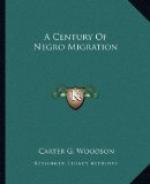Becoming a national measure, therefore, the migration evoked expressions from Frederick Douglass and Richard T. Greener, two of the most prominent Negroes in the United States. Douglass believed that the exodus was ill-timed. He saw in it the abandonment of the great principle of protection to persons and property in every State of the Union. He felt that if the Negroes could not be protected in every State, the Federal Government was shorn of its rightful dignity and power, the late rebellion had triumphed, the sovereign of the nation was an empty vessel, and the power and authority in individual States were supreme. He thought, therefore, that it was better for the Negroes to stay in the South than to go North, as the South was a better market for the black man’s labor. Douglass believed that the Negroes should be warned against a nomadic life. He did not see any more benefit in the migration to Kansas than he had years before in the emigration to Africa. The Negroes had a monopoly of labor at the South and they would be too insignificant in numbers to have such an advantage in the North. The blacks were then potentially able to elect members of Congress in the South but could not hope to exercise such power in other parts. Douglass believed, moreover, that this exodus did not conform to the “laws of civilizing migration,” as the carrying of a language, literature and the like of a superior race to an inferior; and it did not conform to the geographic laws assuring healthy migration from east to west in the same latitude, as this was from south to north, far away from the climate in which the migrants were born.[17]
The exodus of the Negroes, however, was heartily endorsed by Richard T. Greener. He did not consider it the best remedy for the lawlessness of the South but felt that it was a salutary one. He did not expect the United States to give the oppressed blacks in the South the protection they needed, as there is no abstract limit to the right of a State to do anything. He would not encourage the Negro to lead a wandering life but in that instance such advice was gratuitous. Greener failed to find any analogy between African colonization and migration to the West as the former was promoted by slaveholders to remove the free Negro from the country and the other sprang spontaneously from the class considering itself aggrieved. “One led out of the country to a comparative wilderness; the other directed to a better land and larger opportunities.” He did not see how the migration to the North would diminish the potentiality of the Negro in politics, for Massachusetts first elected Negroes to her General Court, Ohio had nominated a Negro representative and Illinois another. He showed also that Mr. Douglass’s objection on the grounds of migrating from south to north rather than from east to west was not historical. He thought little of the advice to the Negroes to stick and fight it out, for he had evidence that the return of the unreconstructed Confederates to power in the South would for generations doom the blacks to political oppression unknown in the annals of a free country.




